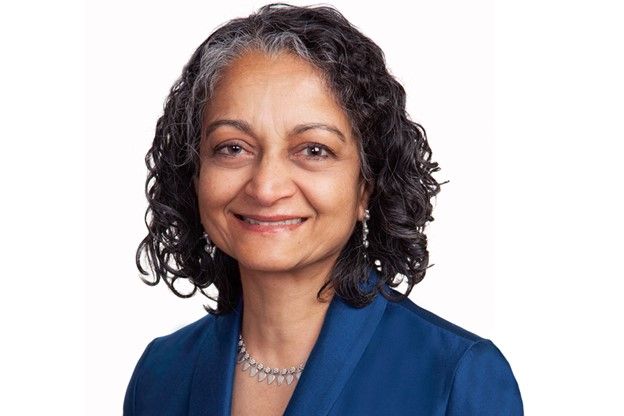Geeta Aiyer had a hunch about the significance of environmental, social and governance, or ESG, investing long before it became a $17 trillion market.
Growing inequities, moments of social reckoning and a broad recognition that the decarbonization of the economy must begin have spurred more investors than ever to use their wealth to push for change. Aiyer, a pioneer of ESG since the 1990s, said it’s been a long and lonely road to get to this inflection point.
“It feels like there’s no turning back,” she said. “For a long time, we had these concerns, but now it feels like no one can be at the table in the financial world without thinking of [ESG] or having the ability to address issues. It’s here to stay.”
Aiyer, 63, has dedicated her career and personal passion to using finance to support social good via ESG and impact investing. In 2003, she founded Boston Common Asset Management, where she serves as president. Today it has $5.7 billion in assets under management and 38 employees, and serves endowments, foundations, mission-driven groups and families across the U.S.
Aiyer started the firm a decade after she engaged supermarket giant Albertsons as its competitor faced a $100 million lawsuit based on gender inclusion, and the company’s top executives flew out to speak with Aiyer, then a junior portfolio manager who offered advice about gender discrimination issues.
GLOBAL IMPACT INITIATIVES
Today, the Boston-based asset manager is a recognized stalwart in global impact initiatives dedicated to the pursuit of financial return and social change — an area of the investment world that’s exploded in recent years. Last year, sustainable investing strategies in the U.S. reached about $17 trillion, according to the US SIF Foundation.
“The courage of Geeta’s convictions is inspirational. She has an unparalleled tenacity and unwavering commitment to improve the state of the world,” said Allyson McDonald, CEO of Boston Common Asset Management. “We share a common desire to build a firm that reflects these values and those of our investors.”
Born and raised in Chennai, Calcutta (now Kolkata) and Delhi in India, Aiyer’s worldview has served as a foundation for her values-based approach to investing. Her first job after graduating from the University of Delhi was in an area of India where water was scarce and women were struggling at the bottom of the economic pyramid.
“As a woman, a person of color and an immigrant, there are a lot of dimensions,” she said. “I saw things differently. I understood things differently as to what affects the lives of women and how things affect different segments of society. Therefore, I’m much more attuned to things like climate change and growing inequality — these I see much clearer.”
Aiyer said that she feels lucky to have had parents who invested in her education. After that first job in the 1980s, she moved to the U.S. to attend Harvard Business School, where she earned an MBA in finance. Between the mid-1980s and starting her own firm in 2003, Aiyer added Cambridge Associates, US Trust Co. and Walden Asset Management to her résumé.
When building Boston Common, Aiyer said it was critical to create a culture that would be innovative and cutting-edge. She believed she could make more of a difference with her own firm, as opposed to needing to be a profit center within a larger entity.
Aiyer said climate change is top of mind at her firm today because it’s an urgent issue that needs solutions immediately.
“It’s hard to overlook climate change. It’s here, it’s urgent, it’s escalating, it’s cumulative,” she said. “We have lost too much time when gradual change would have been possible. I see a lot of interconnected issues, which are mutually reinforcing, including health and well-being.”
“As we saw last year, we are an interconnected planet,” Aiyer added.
Not only are regions interconnected, but people from different levels of society are connected, and their issues and challenges are mutually reinforcing, she said. In that light, Boston Common has had to scale up its efforts.
“Action, even if imperfect, needs to be very decisive, intentional and taken early,” she said. “And that early action is worth a lot more. We have to do a lot more. We have to front-load our efforts in order to address a resilient future and inclusive society.”
KEY TO BUILDING A BUSINESS
Aiyer’s key to building a business that will create meaningful change is simple: Businesses need to have diverse leadership that is fully invested in ESG in order to thrive with the growing market.
“You gain so much from the diversity of perspective,” she said. “But you need to be very intentional about it because just having a diverse roster is not sufficient. Everyone must have a seat at the table and a voice in the discussion. That’s what inclusion is.”
Diversity includes gender, race and ethnicity, but also where people have lived and worked, Aiyer said.
“In the investment team, we’ve looked for people with different investment philosophy backgrounds, I think we are enriched by that, because the thing you want to avoid is groupthink, and also the old-fashioned way of figuring out what my opinion should be based on what the head person has to say.”
Leaders with diverse backgrounds also make the best money managers, who will strive to use finance for good, Aiyer said. “Women are exceptionally good money managers, people of color are exceptionally good money managers, why would we as an industry lose out on that?”
Diverse groups have always had to be prudent with managing resources; they have had to think, look ahead, and plan for risks.
“These are invaluable tasks, invaluable skill sets that should be within finance,” Aiyer said. “For finance to prosper, we need that.”








